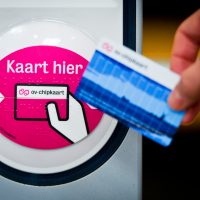ON THE DEVELOPMENT: “The Dutch OV-chipkaart (public transport chip card) was developed in a time when mobile phones couldn’t do much yet. It was something new back then, having a separate information carrier (the card itself) and application (the payment system). But nowadays, touching a card to a card reader isn’t necessary any more, now that we have our smartphones. So the current data carrier has essentially become superfluous. And the application was pretty badly made to begin with, mainly looking after the interests of the transportation companies and not those of the users.”
ON SYSTEMS ABROAD: “I’ve seen many different systems abroad, but having to buy credit in advance is a very uncommon thing in the world. Moreover, other countries’ systems prove that the OV-chipkaart and a modern bank card can do the same thing. So why not adapt the current system?”
ON PRIVACY: “I don’t think new payment methods like payment by smartphone or with a bank card would violate travellers’ privacy more than the current system does. Here’s a comparison: if you use the Pathé app now to buy a cinema ticket with your bank card, they’ll know you went to see a film. But they won’t know when, in what cinema, and what film you’ve been to. Moreover, banks are subject to much stricter privacy regulations than OV-chipkaart companies are. A bank wouldn’t know a thing about your journey itself; at most it would know you’ve withdrawn a certain amount of money at a certain time and location. And if you really want to be anonymous, you can always pay with cash or buy a prepaid credit card. Those exist! It would probably also possible to build a lot of privacy into a system where you’d pay with your phone. Even the payment itself could be reasonably anonymous that way, using bitcoins for example.”
DRAWBACKS: “The disadvantage of a smartphone is that it can run out of battery power at a bad time. And then you’ll be standing there in front of a ticket barrier that won’t let you through. It would probably also be the most expensive adaptation, as systems go. For bank card payments, there’s the hope that the current OV-chipkaart readers could just be upgraded. Then again, there have been so many big egos involved in the development of the OV-chipkaart, and there have been enormous investments into it. That makes me wonder if they’ll be willing to decommission the current system within the next few years.”
Danny Mekić is “most successful young entrepreneur” of the Netherlands and an expert on future technology

Leave a Reply